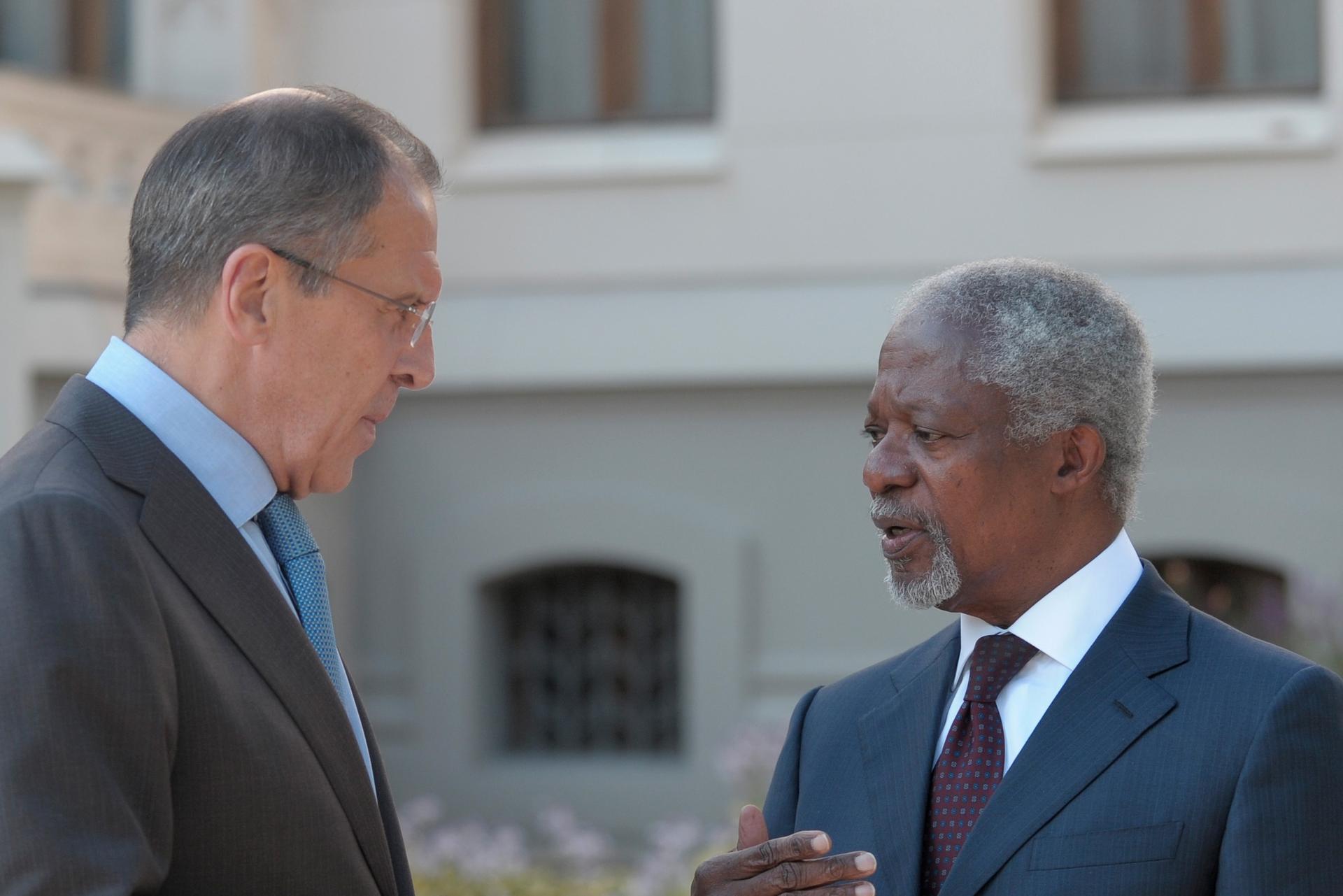Kremlin stalls on Syria
He’s not interested: Kofi Annan speaking to Russian Foreign Minister Sergei Lavrov in Moscow on Monday.
The Kremlin is forcing itself back into global attention this week during a visit to Moscow by UN special envoy Kofi Annan. He is there to urge Russia to pressure its ally Syria to stop the violence that has killed more than 10,000 people.
However, the latest attempt to persuade Moscow to help facilitate a political transition is not only quixotic, it’s counterproductive.
It has never been more urgent for the international community to adopt a new, workable approach to ending the Syria crisis. That will require delicately going around the UN without undermining the organization’s influence. Although the possibility of doing so raises many questions, one thing is clear: since Moscow’s interests lie not in resolving the crisis as much as leveraging it to increase Russian importance, continuing to operate on the basis that the current course is the only way forward is bad not only for Syria, but for the UN’s authority.
More from GlobalPost: IMF cuts global growth forecast
The Kremlin poured cold water on the notion it would help end the bloody crackdown even before Annan departed for Moscow on Monday, indicating it will do little more than restate support for his peace plan as the “only viable platform” for ending the crisis. “He will not leave power,” Russian Foreign Minister Sergei Lavrov said of Syrian President Bashar al-Assad on Sunday. “Not because we are protecting him but because there is a very significant part of the Syrian population behind him.”
Annan’s visit comes at a crucial time in the conflict the Red Cross categorized on Sunday as a civil war. The mandate for UN observers in Syria runs out later this week as fierce fighting moves closer to the center of Damascus. Western countries are circulating a draft resolution that would extend the UN mission. But Russia has drafted its own resolution without the threat of sanctions against Syria, and accuses the West of “blackmail.”
Moscow often restates its position that the UN is the only platform for taking action over Syria, and repeatedly warns the organization is under threat of collapse because of actions by the United States, Britain and other countries it accuses of seeking to undermine it. The Kremlin was particularly upset by the NATO-led bombing of Libya, which it says went beyond the UN resolution that authorized the use of force.
However, no country has done more in recent years to use its veto in the Security Council to hamstring the UN’s efficacy than Russia, which, together with China blocked a resolution calling on Assad to hand over power earlier this year.
Moscow has helped stoke the Syrian conflict in more ways than helping turn the Annan peace plan into a joke. When a Russian, Curacao-flagged cargo ship carrying military helicopters and air-defense equipment was forced to turn back last week after the British insurance company cancelled its coverage, the vessel was promptly reflagged as Russian and sent back on its way.
Pretending to see nothing unusual about sending military aid to a violent regime that happens to be Russia’s last ally in the Middle East makes Moscow appear ridiculous. But the Kremlin appears set to maintain its line as long as its obstruction generates headlines. Convincing Russia otherwise would require more than Secretary of State Hillary Clinton’s laudable but ineffective warnings about the damage to Russian influence and prestige, or her urging of other countries to censure Moscow.
More from GlobalPost: Who's in charge of North Korea's army?
Finding a way to act outside the UN by assembling the broadest possible coalition of countries interested in ending Syria’s violence would be less urgent were Russia not already undermining the organization. Ending the talk that Russia’s role is crucial for the success of peace would be an important first step.
We have seen similar situations in the past. Russia backed former Serbian President Slobodan Milosevic until the day his country’s government sent him to the Hague in 2001. Moscow’s current attempt to play Cold War-style geostrategic games is not only bad for the UN and Syria, but complicates the hopes of Russians who want their country to someday rejoin the international community as a constructive partner. The sooner Russia is made irrelevant for the Syria issue, the better it will be for all sides.
The story you just read is accessible and free to all because thousands of listeners and readers contribute to our nonprofit newsroom. We go deep to bring you the human-centered international reporting that you know you can trust. To do this work and to do it well, we rely on the support of our listeners. If you appreciated our coverage this year, if there was a story that made you pause or a song that moved you, would you consider making a gift to sustain our work through 2024 and beyond?
